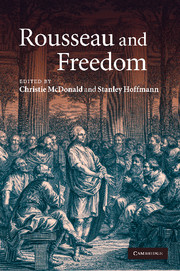Book contents
- Frontmatter
- Contents
- List of illustrations
- Notes on contributors
- Acknowledgments
- List of abbreviations
- Introduction
- PART I
- PART II
- PART III
- 14 Paranoia and freedom in Rousseau's final decade
- 15 Freedom and the project of idleness
- 16 On the uses of negative freedom
- 17 Fail better: Rousseau's creative délire
- Postface: Rousseau and freedom
- Bibliography
- Index
17 - Fail better: Rousseau's creative délire
Published online by Cambridge University Press: 05 May 2010
- Frontmatter
- Contents
- List of illustrations
- Notes on contributors
- Acknowledgments
- List of abbreviations
- Introduction
- PART I
- PART II
- PART III
- 14 Paranoia and freedom in Rousseau's final decade
- 15 Freedom and the project of idleness
- 16 On the uses of negative freedom
- 17 Fail better: Rousseau's creative délire
- Postface: Rousseau and freedom
- Bibliography
- Index
Summary
I have never believed that man's freedom consisted in doing what he wants, but rather in never doing what he does not want to do; and that is the freedom I have always laid claim to, often preserved, and most scandalized my contemporaries about.
Jean-Jacques Rousseau, Reveries of the Solitary WalkerFailure for Jean-Jacques Rousseau is not merely a sense of inadequacy; the celebrated opener of the Social Contract makes this clear: “Man is born free, and everywhere he is in chains.” Failure is the basis on which Rousseau's social, political, and personal thought rests. Yet his interpretation of failure is as complex as are his ideas about freedom. A disjunction between facts and the concrete, on the one hand, and a utopian vision, on the other, galvanizes Rousseau's political and social thought. He states that he only fully articulated the first principles of his work in his autobiographical writings, at the end of his life, when he linked his anthropological and sociopolitical thought to his own life-writing. These principles define the freedom not just to change or to reform thought, but to inaugurate a sense of self and society different from what came before.
Within a sequence of autobiographical texts (including messages and letters), we see the principle of transformation in society commanded by Rousseau's fatal diagnosis of culture, the way he engages not only with questions about rights and facts, and differing conceptions of authority, but also with freedom in relation to contemporary society.
- Type
- Chapter
- Information
- Rousseau and Freedom , pp. 274 - 291Publisher: Cambridge University PressPrint publication year: 2010



